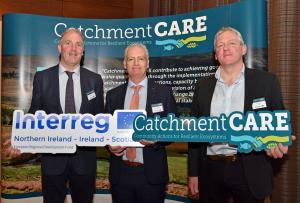Willow plantations can contribute to a more sustainable environment
Date published:
With a recognised need to improve water quality in river catchments across Ireland, a recent cross border seminar explored the benefits of using ‘nature-based’ solutions for Water Quality Protection. The event, held at in Dundalk recently, explored the benefits of Short Rotation Coppice (SRC) willow planting and aimed to assess stakeholder interest & commitment to the principle of SRC and how this might fit with national strategies and address future environmental challenges.

The event was organised by Donegal County Council, the Agri-Food and Biosciences Institute (AFBI) and Teagasc, as part of the EU-funded Interreg CatchmentCARE (Community Actions for Resilient Eco-systems) project.
The seminar explored Short Rotation Coppice through a number of presentations, information polls and a question and answer session. The event was attended by those involved in water and environmental policy, water utilities, catchment management, energy, climate change and local authorities as well as those with an interest in exploring the potentials of using willows, mainly as landscape interventions and mitigation of runoff pollution but also how SRC can contribute to the sustainable energy, bioresources and climate change challenges.
The event was opened by Mr Michael McGarvey, Director of Services at Donegal County Council and the project introduced by Mr Con McLaughlin, EU CatchmentCARE Project Manager. A number of presentations were then given outlining the problem of Green House Gas emissions from Agriculture and Agriculture’s role in meeting environmental objectives to set the scene.
In recent decades, there has been a strong research focus on the multifunctional benefits of willows. Chris Johnston, project leader at the Agri-food and Biosciences Institute in Northern Ireland (AFBI), who has much expertise in sustainable waste water management using willows, provided the audience with information from the recent research and commercial schemes currently in operation. He stated that “catchments on the island of Ireland are suffering as a result of agricultural diffuse as well as societal point source pollution, and so this conference exploring the potential benefits of SRC willow is timely”. He went on to say that “with the goal of achieving a net zero carbon future, it is opportune that nature based solutions such as SRC willow, which can integrate with landscapes and ecosystems, are being considered for deployment to mitigate growing environmental pressures.”
The event confirmed the understanding that biomass crops, if implemented properly in our agricultural landscape, can not only provide sustainable waste management and environmental protection, but can also contribute significantly to a more bio-diverse and net zero carbon future while underpinning rural biomass supply chains, agricultural diversification and SME development & employment benefits.
Notes to editors:
Notes to editors:Photo captions:NR20.03.01-1: Barry Caslin (Teagasc), Con McLaughlin (Donegal County Council) and Chris Johnston (Agri-Food and Biosciences Institute) at the Catchment CARE “Willow Planting for Water Quality Protection” event in Dundalk on 5th March 2020.AFBI carries out high quality technology research and development, statutory, analytical, and diagnostic testing functions for DAERA and other Government departments, public bodies and commercial companies.AFBI's Vision is “Advancing the Local and Global Agri-Food Sectors Through Scientific Excellence”.AFBI's core areas:- Leading improvements in the agri food industry;- Protecting animal, plant and human health;- Enhancing the natural and marine environment.CatchmentCARE (Community Actions for Resilient Eco-systems) is a €14m project funded under the European Union’s INTERREG VA Programme and aims to improve freshwater quality in river basins across three cross-border catchments. The aims will be achieved through the development of three water quality improvement projects in the Finn, Blackwater and Arney catchments and the installation of a new network of 50 groundwater monitoring stations across the region to better understand the interaction between groundwater and surface water bodies.The project, which is 61 months in duration, has a partnership of eight from Ireland and Northern Ireland. Council partners include Donegal County Council (DCC) and Armagh City, Banbridge and Craigavon Borough Council (ABC).Academic partners include Agri-Food & Biosciences Institute (AFBI) and Ulster University (UU). Specialist partners include Geological Survey of Ireland (GSI) and British Geological Survey (BGS). State agency partners include Inland Fisheries Ireland (IFI) and the Loughs Agency (LA). See more at http://www.catchmentcare.eu/.The Special EU Programmes Body is a North/South Implementation Body sponsored by the Department of Finance and Personnel in Northern Ireland and the Department of Public Expenditure and Reform in Ireland. It is responsible for managing two EU Structural Funds Programmes, PEACE IV and INTERREG VA which are designed to enhance cross-border cooperation, promote reconciliation and create a more peaceful and prosperous society. The Programmes operate within a clearly defined area including Northern Ireland, the Border Region of Ireland and in the case of INTERREG VA, Western Scotland.The INTERREG VA Programme has a value of €283 million and aims to address the economic and social problems which result from the existence of borders.All media enquiries to AFBI Press Office 028 9025 5326.